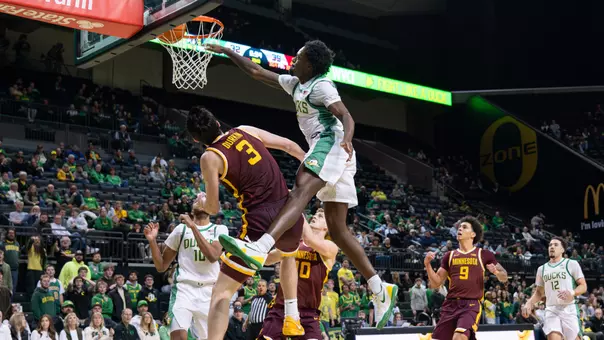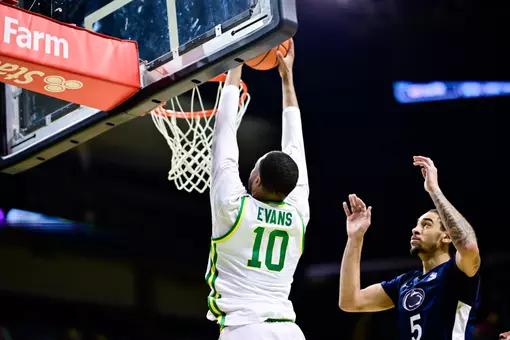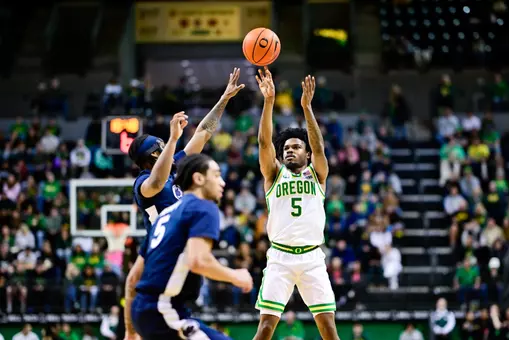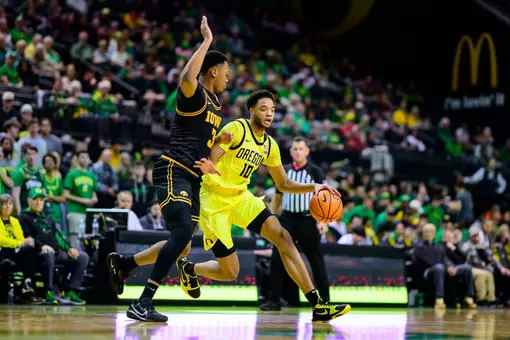
Pritchard Stepping Up On Big Stage
03/21/19 | Men's Basketball, @GoDucksMoseley
Oregon's junior point guard fought through immense pressure to lead the Ducks through a midseason slump, and now has helped them back to the NCAA Tournament.
SAN JOSE, Calif. – He wanted it so bad, he was getting in his own way.
Payton Pritchard wanted to be the guy to lead the Ducks out of their injury ravaged depths as the calendar flipped from 2018 to 2019. Wanted to fulfill his destiny as the in-state kid starring at Oregon. Wanted to taste again an NCAA Tournament run like the one the UO men experienced his freshman year, and which he was deprived of as a sophomore.
He wanted all of that so bad, it hurt – hurt his game, more than anything. Pritchard showed up early to practice, left late, put up endless shots, ran until sweat rolled off his shoulders, and pounds were shed from his frame. None of it seemed to help.
There were several keys to Oregon's late-season renaissance, which has the Ducks poised to meet Wisconsin in a first-round NCAA Tournament game Friday (1:30 p.m., TBS). The Ducks embraced head coach Dana Altman's defensive demands, and rallied around an unlikely source of leadership, freshman post Francis Okoro.
And they also saw their junior point guard, Pritchard, shed the burden of expectations and find freedom in his game. Pritchard enters the NCAA Tournament having scored in double figures eight of his last nine games, and coming off a Pac-12 Tournament in which he was named most outstanding player for setting the tone in Oregon's tenacious defense.
"I would like to say this is how I should be playing," said Pritchard, the West Linn native who is the only remaining player with experience from Oregon's 2017 Final Four run. "It was a lot of hard work. There's going to be ups and downs, and it wasn't a smooth road."

Pritchard was 1-of-10 from the floor in Boise. Two games later, he went 0-of-6 as the Ducks squandered a late lead against UCLA. A home weekend vs. Washington and WSU yielded 5-of-17 shooting combined, and the loss at USC that ended up being the turning point to Oregon's season saw Pritchard go 2-of-10.
"It's a fine line between being demanding of yourself, but not putting so much pressure on yourself that it really hurts your play," Altman said. "And he probably crossed that line.
"Because he's a much better player than what he's showed at times; he shot 43 percent from three last year, and this year he shot 34. It wasn't that he didn't put the time in, and it wasn't that he didn't have good shots. He had some good looks. You can't aim the ball; you gotta shoot it. He was trying to make sure they all went in, and that's just really difficult."
By the time the Ducks came back from Los Angeles in late February, they'd lost four of their last six games. From a national perspective, their NCAA Tournament hopes weren't even on life support; they were dead and buried. It seemed that Oregon had nothing left to lose. And Pritchard started to play like it.
In Pac-12 play this season, he averaged 12.2 points per game, shooting .406 from the floor overall and .324 from three-point range. But during Oregon's ongoing eight-game win streak, since their return from Los Angeles, Pritchard is averaging 15.8 points per game, on .511 shooting overall and .353 from three-point range.
He's not trying to muscle in every shot from the three-point line, or overpower his way to the rim on drives. He letting shots fly in rhythm, and showing a deft touch around the basket. By taking his foot off the gas pedal just a little, Pritchard ironically has found another gear.
"I'm really happy for him," Altman said. "He did put tremendous pressure on himself throughout the year. I think it did affect his play. He's a young man that works really hard and wants to be a really good player. And when he doesn't play well, it really hurts him.
"He's freed himself up the last few weeks, and has played really well – played really well in the conference tournament. So I hope he can continue that, because it's made a tremendous difference."
It's got the Ducks all the way back to the NCAA Tournament. As a freshman, Pritchard figured this would be an annual occurrence. As a sophomore, that notion was shattered.
"It was disappointing not making it; it was kind of embarrassing," Pritchard said. "To be back this year, I forgot how sweet it is. It's a great feeling to make the tournament, and nobody should take it for granted."
A year ago, Pritchard watched first-round NCAA Tournament games, in the midst of Oregon's two-game NIT appearance. But he couldn't bear to watch later rounds. They just served to remind him of a goal the Ducks failed to achieve.
So he spent time with family, and plotted how to get the Ducks back into the Big Dance. Now, they're here. The return may not have gone entirely according to script. But Pritchard has fulfilled his destiny, and helped lead Oregon back into the NCAA Tournament.
"It's good to get the program back here," he said. "Where it should be."

















